The Top 10 Albums That Richie Faulkner Listed As His Favorites

Richie Faulkner names his favorite albums of all time. One of the most-known heavy metal guitarists, Richie Faulkner, loves to add impressive guitar tones, solos, and styles to his music and riff as solo parts for his music bands like Judas Priest. In this article, we will detail the albums that Richie Faulkner listed as his favorite of all time.
As a member of the biggest heavy metal band Judas Priest, six-string guitar legend Richie Faulkner uses his Signature Gibson Flying V to shred like a hero.
Richard Faulkner, a famous British guitarist, is a big deal in the heavy metal genre. He is known for his amazing skill, electrifying stage personality, and member of the legendary heavy metal band Judas Priest. Before longtime guitarist K.K. Downing left the band in 2011, Faulkner filled in for him and quickly made a name for himself with his superb guitar playing and smooth fit into the band’s signature sound.
Faulkner started making music when he was young, inspired by his love of hard rock and heavy metal. He is from London, England. Before joining Judas Priest, he worked on different musical projects that showed how good he was at playing his instrument and how much he loved it. When he joined Judas Priest, it gave the band new energy and ideas.
Around April 20, 2011, Faulkner was hired to take over as guitarist for the heavy metal band Judas Priest after K. K. Downing. Guitarist Pete Friesen, who they both know, told the band about him. Interestingly, Friesen and Faulkner used to play together in a cover band in London called Metalworks, which is also the name of a Judas Priest album that came out in 1993.
They called the wrong number, so they emailed him twice. Faulkner got rid of them because he thought they were spam. The band set out to find him and got his real phone number in the end. People in charge of the band called Faulkner, but he thought it was a joke. The next day, he went to Glenn Tipton’s house to meet him. Rob Halford was also there. Faulkner played a few pieces for them while they talked. They gave him some tracks to listen to and saw what he would do on the leads. Then, they moved on to other things. When Faulkner came back a week later, they offered him the job. He didn’t tell anyone about it for a month until it was made public.
Richie Faulkner played his first show with Judas Priest on American Idol in 2011. The band played “Living After Midnight” and “Breaking the Law” with James Durbin.
Rob Halford and Glenn Tipton talk about how Richie Faulkner saved Judas Priest. Rob Halford said in a 2015 discussion: “Let’s face it, to some extent, Richie [Faulkner] saved Judas Priest because if we hadn’t found him at the crucial time that we were looking for a guitar player, things could have turned out quite differently.”
Here are the musicians that Richie Faulkner called them as his favorites. Faulkner named Black Sabbath, Deep Purple, Thin Lizzy, Iron Maiden, Judas Priest, UFO, Rainbow, and Metallica some of his early musical influences.
He also added Jimi Hendrix, Brian May, David Gilmour, Eddie Van Halen, Dave Murray, Randy Rhoads, Zakk Wylde, Kirk Hammett, and Michael Schenker as some of the guitarists who had the most impact on his playing.
Look at Judas Priest‘s guitarist Richie Faulkner‘s favorite albums below!
Related: The Top 22 Heavy Metal Halloween Songs of All Time
Richie Faulkner’s Favorite Albums That He Can’t Live Without
Judas Priest‘s famous guitarist, Richie Faulkner, has shared his respect for other musicians, too. And Faulkner picks his favorite albums he can’t live without. Regardless, he loves to listen to different genres but also loves alternative rock, classical rock, blues, punk-rock, thrash metal, death metal, and heavy metal musicians, particularly those who influenced him in his musical career.
Which music albums does Richie Faulkner listen to?
- “…And Justice For All” – Metallica
- “Reckless” – Bryan Adams
- “Vol. 4” – Black Sabbath
- “Smash Hits” – Jimi Hendrix
- “Invisible Touch” – Genesis
- “Somewhere in Time” – Iron Maiden
- “Painkiller” – Judas Priest
- “Life After Death” – Iron Maiden
- “On With The Action – Live At The Roundhouse 1976” – UFO
- “Electric Ladyland” – Jimi Hendrix
1. “…And Justice For All” – Metallica
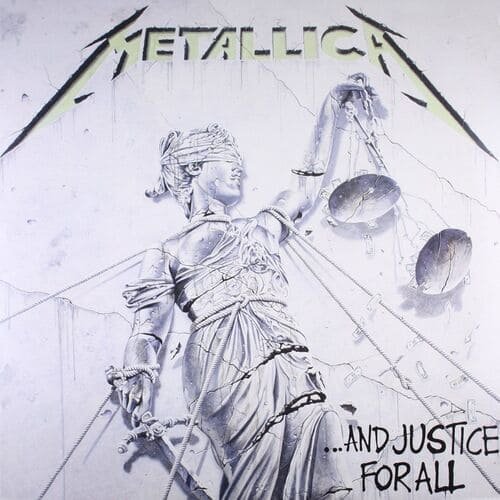
Metallica‘s “…And Justice for All,” album released in 1988, is a classic heavy metal song that shows how committed the band was to trying new sounds and writing intense lyrics.
“…And Justice for All” has the band’s signature intense guitar riffs, thunderous drumming, and thoughtful lyrics. It’s about government corruption, social unfairness, and the fight for freedom and equality. Songs like “One,” which has mysterious rhythms and a strong anti-war message, and “Blackened,” which is fast and has some fast guitar solos.
Music reviewers praised “…And Justice for All” for its depth and complexity, but they also said that the mix was too dry and the bass guitar was hard to hear. It was nominated for a Grammy Award in 1989, but Jethro Tull beat it out in the Best Hard Rock/Metal Performance Vocal or Instrumental category, which caused a lot of controversy. It was also included in The Village Voice’s annual Pazz & Jop poll of the year’s best records. “One” was Metallica’s first song, and it also won them their first Grammy Award in 1990. It did well in the U.S., reaching number six on the Billboard 200.
Also, in 2003, the Recording Industry Association of America (RIAA) certified it 8× platinum for selling eight million copies in the U.S. The record was rereleased on November 2, 2018, on vinyl, CD, and tape. It also got a special box set with extra songs and video footage that had never been shown before. The release reached number 37 on Billboard’s Top Album Sales chart and 42 on the Top Rock Albums list.
Richie Faulkner shares why he likes Metallica’s “…And Justice for All” as one of his favorite albums of all time:
“This was the record that introduced me to Metallica, and it was exactly what I needed as a teenage guitar player. They had aggressive, complex, great songs, and I gave no thought whatsoever to the fact that there was no bass guitar! To me, it sounded exactly the way it needed to.”
2. “Reckless” – Bryan Adams
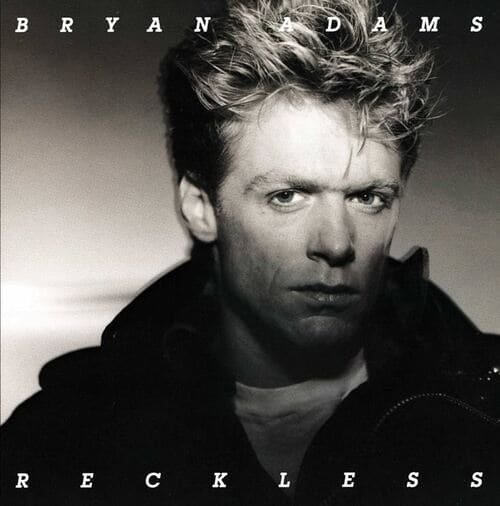
As far as rock music goes, “Reckless,” Bryan Adams‘ 1984 album, is the definitive classic. It shows the Canadian singer-songwriter’s talent and skills to make catchy tunes that appeal to people of all ages.
Featuring hit songs like “Summer of ’69,” “Heaven,” and “Run to You,” “Reckless” summed up the 1980s rock scene with its spirit of youthful exuberance, romantic desire, and catchy choruses that made you want to sing along. “Reckless” not only showed off Adams’ musical skills but also his storytelling skills, with its touching and relatable words about love, heartbreak, and following your dreams.
Richie Faulkner reveals why he likes Bryan Adams’ “Reckless” as one of his favorite albums of all time:
“My first concert was with Bryan Adams at Wembley Arena on the Into the Fire tour.
“Reckless” was the album before and me and my father used to take trips in the car with the volume screaming to anticipate how loud and exciting the show was going to be—a masterclass in songwriting and musicianship, one of my favorite records of all time.”
3. “Vol. 4” – Black Sabbath
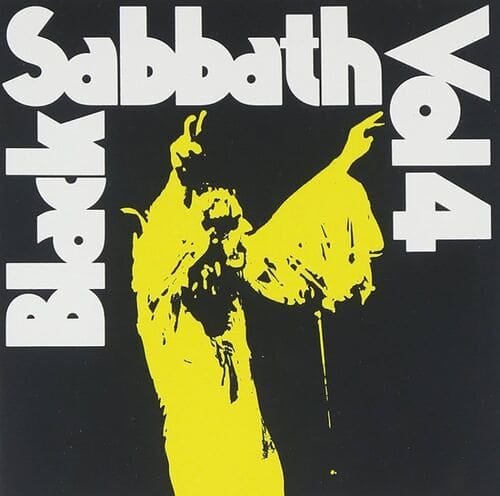
Black Sabbath‘s 1972 record, called “Vol. 4“, is one of the most critical and milestone albums in the history of heavy metal music. “Vol. 4” builds on the dark and ominous rhythms of their previous albums by going deeper into themes of self-reflection, addiction, and how complicated life is.
From the strange opening song “Wheels of Confusion” to the famous and loud riff of “Supernaut,” “Vol. 4” strengthens Black Sabbath’s position as heavy metal pioneers with their signature mix of scary guitar work, heavy rhythms, and Ozzy Osbourne’s haunting vocals. The album has a lot of different kinds of songs, like the darkly reflective “Changes” and the intense, riff-driven “Under the Sun,” which show how good the band is.
Black Sabbath members write all songs in this album. Geezer Butler wrote all the songs. Some copies sold in North America have parts of the songs “The Straightener” and “Every Day Comes and Goes.” “The Straightener” is the ending of “Wheels of Confusion,” and “Every Day Comes and Goes” is a two-minute section that acts as the bridge for “Under the Sun.” These parts don’t have titles on the original or any European versions.
Richie Faulkner tells why he likes Black Sabbath’s “Vol. 4” as one of his favorite albums of all time:
“Another band and record that was introduced to me by my dad. Tony Iommi’s guitar playing and sound are a huge influence on me to this day.
Songs like “Wheels of Confusion” and “Snowblind” were just so heavy and otherworldly.”
Related: 5 Albums I Can’t Live Without: Ozzy Osbourne of Black Sabbath
4. “Smash Hits” – Jimi Hendrix
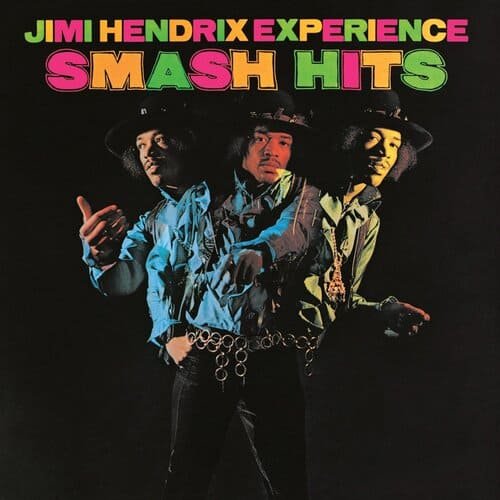
Jimi Hendrix‘s “Smash Hits,” which came out in 1968, is still a classic collection of songs. With some of Hendrix’s most famous and popular songs, “Smash Hits” is a great way to get started with the master guitarist’s revolutionary sound and his innovative approach to rock, blues, and psychedelic music.
The record, which includes electrifying hits like “Purple Haze,” “Hey Joe,” and “The Wind Cries Mary,” shows how dynamic and expressive Hendrix’s guitar playing was. Hendrix was a visionary artist who had a significant effect on rock and roll, and “Smash Hits” shows it with its mix of guitar solos, new production techniques, and thoughtful lyrics.
Richie Faulkner describes why he likes Jimi Hendrix’s “Smash Hits” as one of his favorite albums of all time:
“My first memory of hearing Hendrix.
My father showed me songs like “Voodoo Child” and “House Burning Down.” It sounded like music from another planet. Hendrix is the one that I always go back to when I feel like I need inspiration.”
5. “Invisible Touch” – Genesis
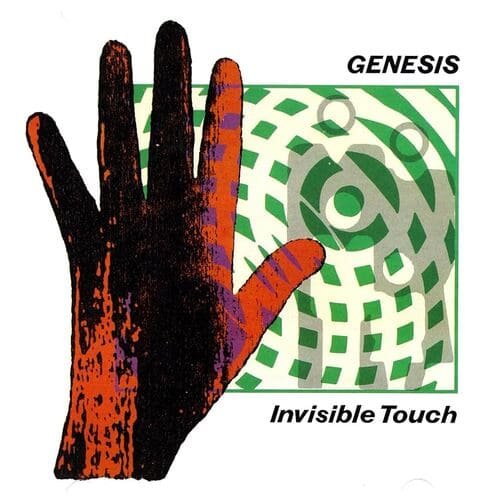
Genesis‘ influential album, 1986’s “Invisible Touch,” celebrated a change in direction for the progressive rock band, moving away from their earlier sound and into pop-oriented rock music. As a turning point in their career, “Invisible Touch” shows Genesis’s ability to adopt a more approachable and commercially acceptable sound.
Highlighted by the number one single “Invisible Touch,” as well as other singles like “In Too Deep” and “Land of Confusion,” the album contributed to establishing Genesis’ place as a musical leader of the 1980s.
Richie Faulkner explains why he likes Genesis’ “Invisible Touch” as one of his favorite albums of all time:
“I learned every lyric to every song on this record by heart. I must have been around six or seven, and although it wasn’t a guitar-heavy record, something about the songs really spoke to me.”
6. “Somewhere in Time” – Iron Maiden
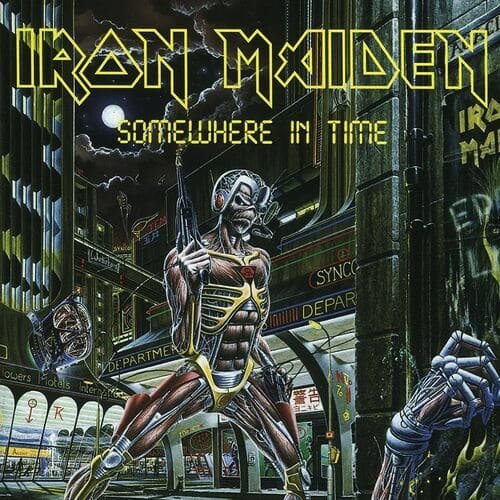
The release of “Somewhere in Time” in 1986 represented a turning moment in Iron Maiden‘s career, displaying the band’s skills to push the limits of heavy metal and reveal their continuing progress as musicians. RIAA has confirmed that over one million copies of Somewhere in Time have been sold since it was first released. And “Somewhere on Tour” was the album’s accompanying tour along with 2021’s Senjutsu; it became the subject of the “Future Past World Tour” in 2023.
Featuring classics like “Wasted Years,” “Stranger in a Strange Land,” and “Heaven Can Wait,” “Somewhere in Time” is a showcase for Iron Maiden’s exceptional musicianship and chronology.
Richie Faulkner explains why he likes Iron Maiden’s “Somewhere in Time” as one of his favorite albums of all time:
“I was out with Lauren Harris, who’s Steve Harris from Iron Maiden’s daughter, and we were out with Iron Maiden quite a bit. And I always used to watch Steve and take notice of the way Steve was always at the front and he was always at the people in their face and he was singing with them — the eye contact; he was pointing at ’em. And I always thought in this day and age of YouTube and videos and stuff like that, you can’t recreate that interaction. I always kind of took that onboard.
And I think that’s kind of — partly at least — where it comes from. Just that interaction that you, as a fan, you walk out of the concert hall and you can’t recreate that. That interaction with the artist on stage, whether it’s a guitar player or a singer or a drummer — whatever it may be — you can’t recreate that interaction that you share at that moment in time. I think that’s a valuable thing. So I think that’s partly to do with it — Steve Harris and the way that interacted with the audience.”
7. “Painkiller” – Judas Priest
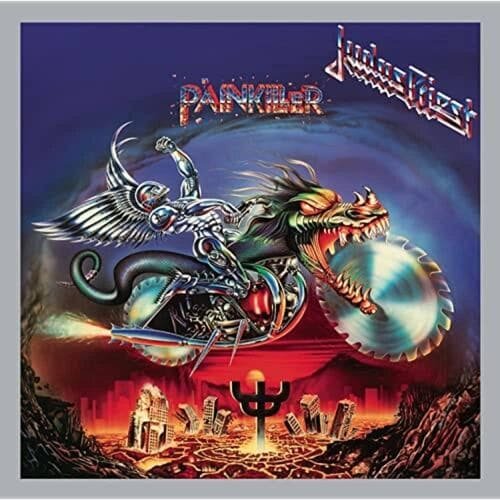
Judas Priest‘s achieving return to form in 1990’s “Painkiller” established the band’s place as heavy metal pioneers and made the album an instant classic.
The album’s highlights, including the title songs, “Painkiller,” “Hell Patrol,” and “A Touch of Evil,” showcase Judas Priest‘s musical talent and their ability to create a dramatic and explosive aural experience. Rob Halford’s impressive vocals and the album’s thunderous rhythms have helped “Painkiller” become a classic in the band’s repertoire, winning them critical praise and a legion of fans worldwide.
Drummer Scott Travis, who joined Judas Priest in 1989 after longtime drummer Dave Holland left the band, appears on the album for the first time on Painkiller. Travis, a former member of the Los Angeles band Racer X, offered Judas Priest a fresh sound and harder edge with his extensive usage of double kicks. Heavy metal and speed metal were both used to characterize Painkiller’s sound.
The album’s tracks were laid down in early 1990 in Miraval Studios in Brignoles, France, and then mixed in December 1990 at Wisseloord Studios in Hilversum, the Netherlands. It was produced by the band and Chris Tsangarides, marking the first time that Judas Priest hadn’t worked with Tom Allom since 1978’s Killing Machine and the first time that the band and Tsangarides had collaborated since 1976’s Sad Wings of Destiny.
The keyboard work on “A Touch of Evil” was handled by Don Airey. Airey doubled most of the bass lines on a Minimoog synthesizer to create the album’s characteristic bass sound, as he explained in an interview for the year 2020.
Richie Faulkner shares why he likes Iron Maiden’s “Somewhere in Time” as one of his favorite albums of all time:
“This record [Painkiller] introduced me to Judas Priest, and obviously, at the time, I had no idea how influential this record would be in my life. Still a classic to me, and from here, I searched out the back catalog of Priest spanning back to 1974’s Rocka Rolla album.
That drum intro, those guitars from Glenn Tipton and K.K. Downing, and that banshee scream of a vocal from Rob Halford. The perfect ingredients for a young guitar player!”
Related: Rob Halford On Next Judas Priest Album: “Will Arrive In 2024”
8. “Life After Death” – Iron Maiden
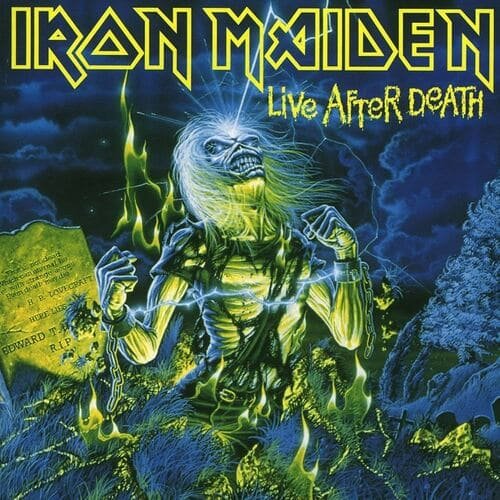
Iron Maiden‘s double live album “Life After Death” was released in 1985. Recorded on the band’s “World Slavery Tour,” the CD captures the raw energy and the infectious enthusiasm that have defined Iron Maiden as one of the most iconic and influential heavy metal bands in the history of rock music.
The album “Life After Death” features several of Iron Maiden‘s most famous songs, such as “The Trooper,” “Aces High,” and “Run to the Hills,” showing the band’s expertise in developing complex musical arrangements that feature the seamless interplay of galloping guitar riffs, thunderous drums, and Bruce Dickinson‘s unique operatic vocals.
9. “On With The Action – Live At The Roundhouse 1976” – UFO
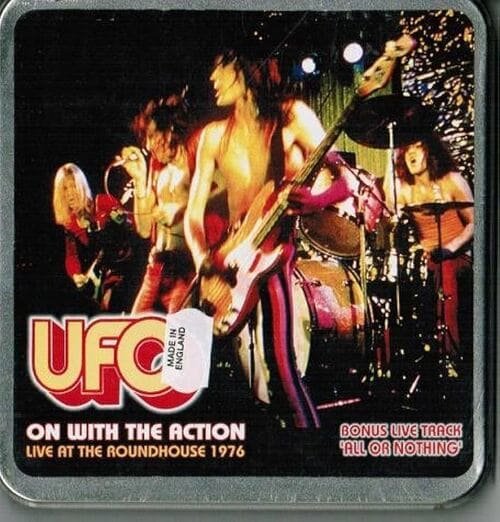
The British rock band UFO was formed in 1968. They were one of the first bands in the New Wave of British Heavy Metal because of their lineup, which included Phil Mogg’s powerful vocals, Michael Schenker’s intricate guitar work, and Pete Way and Andy Parker’s driving rhythms.
Their famous albums like “Phenomenon,” “Lights Out,” and “Strangers in the Night” have cemented their place in rock history. These albums show how dynamically they can play the guitar and write catchy rock songs that people worldwide can relate to.
As a pioneering force in rock music, UFO continues to motivate and affect new generations of musicians and fans. This shows how they have had a lasting effect on the genre’s growth. Although UFO may not have released a record called “On With The Action – Live At The Roundhouse 1976,” their many albums and exciting live shows continue to show how talented they are and how much they have contributed to the history of rock and roll.
Richie Faulkner shares why he likes UFO’s “On With The Action – Live At The Roundhouse 1976” as one of his favorite albums of all time:
“I wore out the needle on this one! It was raw, and the energy was fantastic. Michael Schenker’s guitar playing was and still is a masterclass in rock guitar, and the band was just on fire. They are one of my favorite bands of all time, and this record, to me, really captures the band on their game.”
10. “Electric Ladyland” – Jimi Hendrix
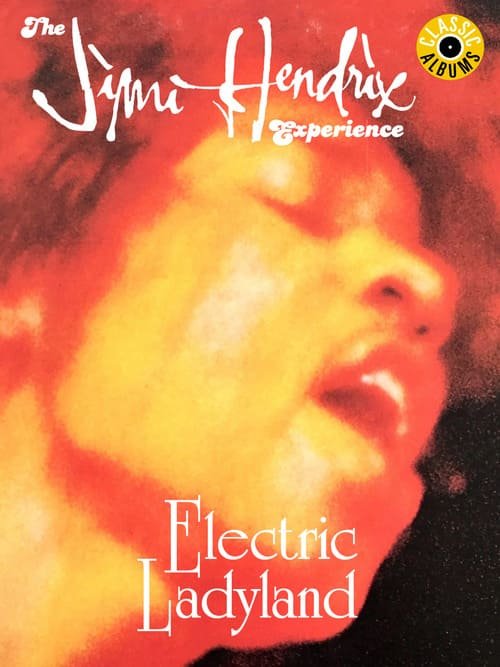
Jimi Hendrix released the famous record “Electric Ladyland” in 1968, which shows how innovative and groundbreaking he was as an artist and guitar legend.
“Electric Ladyland” shows how Hendrix was influenced by many types of music and how he could combine blues, rock, jazz, and R&B without any problems. With timeless hits like “All Along the Watchtower,” “Crosstown Traffic,” and “Voodoo Child (Slight Return),” the record captured listeners with its mesmerizing guitar solos, complex arrangements, and lyrical themes.
Richie Faulkner shares why he likes Jimi Hendrix’s “Electric Ladyland” as one of his favorite albums of all time:
“My first memory of hearing Hendrix. My father showed me songs like “Voodoo Child” and “House Burning Down.” It sounded like music from another planet. Hendrix is the one that I always go back to when I feel like I need inspiration.”
What are your thoughts on Judas Priest‘s guitarist Richie Faulkner‘s favorite albums of all time? Let us know in the comment section!